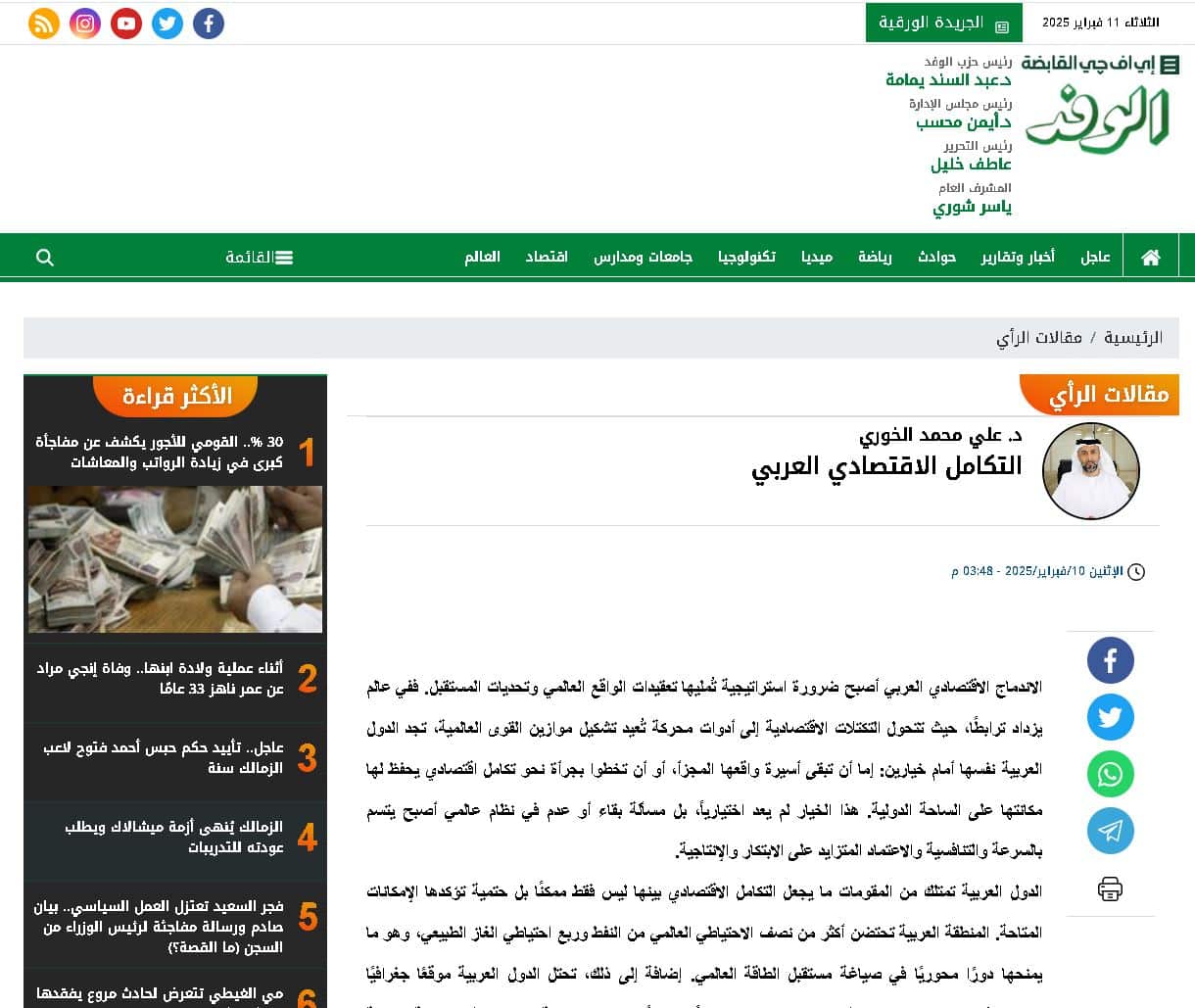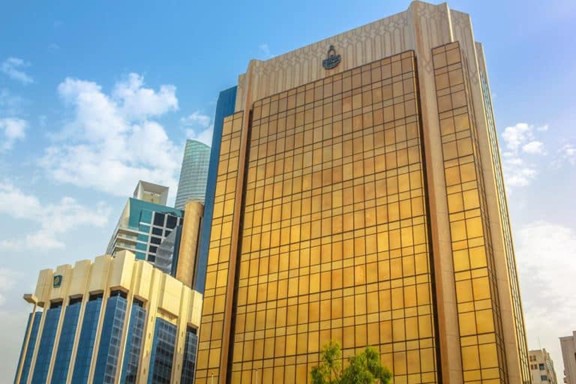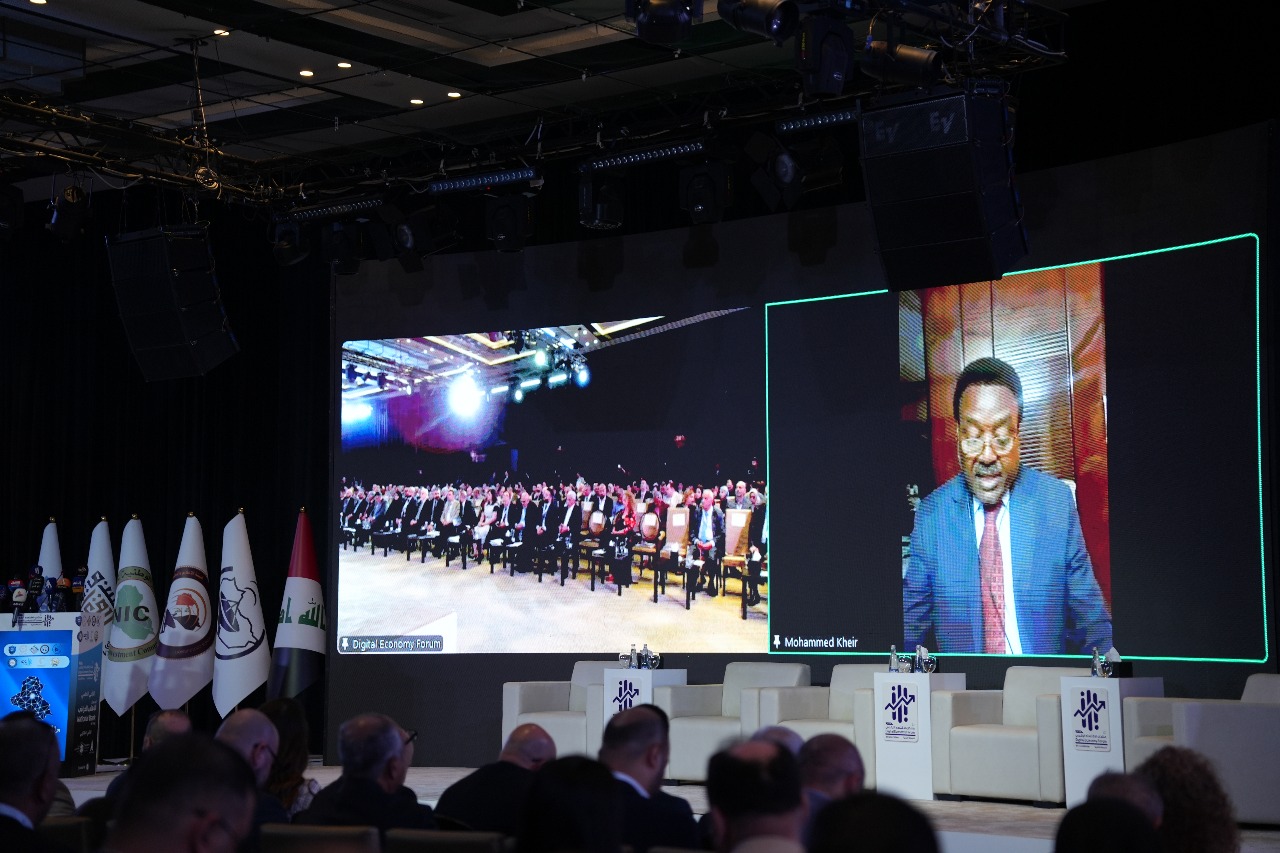Arab Economic Integration
Cairo
Source: Al-Wafd Newspaper
Prof. Dr. Ali Mohammed Al-Khouri
Arab economic integration has become a strategic necessity dictated by the complexities of the global reality and future challenges. In an increasingly interconnected world, where economic blocs are becoming driving forces reshaping the global balance of power, Arab countries find themselves faced with two choices: either remain captive to their fragmented reality, or boldly move toward economic integration that preserves their position on the international stage. This choice is no longer optional; it is a matter of survival or failure in a global system characterized by speed, competitiveness, and an increasing reliance on innovation and productivity.
Arab countries possess the elements that make economic integration among them not only possible but inevitable, confirmed by available resources. The Arab region hosts more than half of the world’s oil reserves and a quarter of its natural gas reserves, giving it a pivotal role in shaping the future of global energy. Furthermore, Arab countries occupy a strategic geographic location connecting three continents, making them a potential hub for global trade if the appropriate infrastructure and integrated policies are in place. But the real challenge lies not in the lack of resources or capabilities, but in the ability to transform these advantages into an integrated project with unified goals, in which Arab countries share a shared vision and interests.
History is replete with Arab attempts to achieve this integration, starting with the establishment of the League of Arab States and continuing with regional free trade agreements. However, these initiatives, despite their importance, have not achieved the essence of the desired change. The reasons go beyond political complexities and regional conflicts to include the absence of a comprehensive economic vision that transcends individual states’ interests and places integration as a strategic priority.
The reality shows that the region suffers from severe economic disparities among its countries. For example, the Gulf states have economies dependent on oil surpluses, which helps them finance their development projects and ensure relative economic stability. In contrast, many other Arab countries face profound economic challenges such as weak economic infrastructure, high unemployment rates, budget deficits, and accumulating debt, making their economies increasingly fragile and unable to compete or participate effectively in any integration project. This difference in economic structure and level of development between countries makes economic coordination a complex task, requiring genuine political will to transcend narrow interests and a shared vision aimed at achieving collective interests that enhance stability and growth across the region.
Another, more complex issue is the lack of economic diversification in most Arab countries. The near-total dependence on oil exports makes Arab economies vulnerable to fluctuations in global markets, while other productive sectors such as industry, agriculture, and services continue to suffer from weak performance and a lack of investment.
To achieve Arab economic integration, countries must adopt comprehensive national strategies aimed at diversifying their economies, relying on innovation, technology, and the development of local production. The UAE experience, for example, demonstrates how an Arab country can adopt a successful diversification policy to increase the contribution of non-oil sectors to GDP, achieving economic stability and high competitiveness. According to data from the UAE Federal Competitiveness and Statistics Center, the contribution of non-oil sectors rose to 74.9% of GDP in the second quarter of 2024, while the oil sector’s contribution reached 25.1%. However, Arab economic integration cannot be achieved simply by improving the economic performance of each individual country. The greatest challenge is building a strong institutional framework to manage and guide this integration. The UAE’s experience highlights the importance of political will, strategic planning, and investment in infrastructure and technology, which are critical factors for the success of any integration project in the region.
The European experience also provides an inspiring model, as the European Union has played a crucial role in coordinating fiscal, monetary, and trade policies among member states. The Arab region needs a regional institution with the necessary powers and resources to advance integration. This institution could be responsible for developing common policies, such as unifying customs tariffs, facilitating capital flows, developing cross-border infrastructure, and enhancing cooperation in innovation and scientific research.
Economic integration does not simply mean building common markets or reducing customs barriers; it also requires investing in building trust among Arab countries. This trust can only come about through genuine initiatives that demonstrate countries’ commitment to achieving common goals. Arab countries are facing a demand for cooperation on major regional projects, such as the establishment of integrated transportation networks that connect Arab countries, contribute to the development of economic and social infrastructure, and serve as a model for sustainable development. Such projects will bring economic benefits on the one hand, but they will also certainly support the spirit of unity and belonging to joint Arab projects.
Overall, in light of current global challenges such as climate change and the demands of digital transformation, Arab countries find themselves with an opportunity to reshape their economic path. The absolute truth is that the world is rapidly shifting towards a digital economy based on innovation and technology, and if Arab countries do not seize this opportunity, they may find themselves left behind. Arab economic integration can serve as a platform for entering this new era by investing in digital infrastructure, developing educational policies to build digital skills, and encouraging innovation-driven startups.
The vision of Arab economic integration can only be realized if we move beyond the traditional view that views integration as an impossible challenge. Instead, it must be viewed as a strategic opportunity worthy of effort and investment. A united Arab world, if economically unified, will possess all the elements to become a global economic powerhouse, competing with major blocs such as the European Union and ASEAN. Achieving this goal requires genuine political will, a clear strategy, and investment in building the Arab citizen as a central pillar of this vision. This is the only way to turn ambition into reality and make the Arab world an active partner in shaping the future of the global economy.












